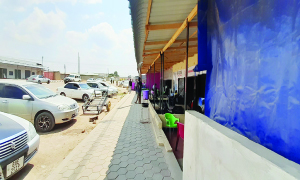
•In a quest to help grow the Zambian economy, the Somali community is engaged in various economic activity in Ndeke township of Ndola. Above are some of the shops operated by the Somali community. Picture by MUSONDA MANGILASHI
By BENNET SIMBEYE –
“OUR people have been here for a long time and to be honest with you, I can understand why they have stayed for so long and many more keep coming. This is a wonderful country and I do not regret the nine years I have spent here”.
Abdirizak Osman, a Somali resident in Ndola, Zambia’s Copperbelt capital, reflects on the positive story, which is how both documented and undocumented migrants have found a home in Zambia and how keen they are on contributing to its prosperity.
Mr Osman called for more support to migrants and refugees who are committed to positively contributing to their communities and the national economy at large.
He said there were many undocumented migrants that were keen on contributing economically but were restricted because of their status.
Mr Osman said in an interview that in most instances, it was not that the migrants had entered the country illegally, but that they could have migrated as refugees but that they were now looking to better their lives and contribute to their new home country.
Ndola has one of the largest Somali migrant populations in the country and most of them are entrepreneurs especially in the transportation industry.
He said there was need to cut down on restrictions to movement of people countries, the region, as well as the continent.
“It is not easy for most of these people to change their status from refugee to anything else because of the red tape,” he said.
“If you look at the Somali community here in Zambia for example, most of them are into business but depending on their immigration status, they cannot conduct their businesses effectively because they cannot even travel out of the country for any transactions”.
Mr Osman said, however, that his experiences in Zambia as a foreigner were good mostly because of the social and economic stability.
He said Zambians were welcoming and supportive to foreigners and that it was not surprising that most of them wanted to stay and provide their labour and business skills to the economy.
“In all my nine years here working for a transport company, I have seen that we are basically the same people and only language and cultural practices differentiate us,” he said.
Ahmed Omar, a sheik at the local mosque, said there was something to be said about the welcoming manner in which Zambians treated foreigners.
Sheik Omar said this environment encouraged migrants to return the favour with exemplary conduct through interactions both socially and economically.
He said he would like to see more interaction and integration with locals to ensure further harmony, regardless of religious affiliation.
These sentiments were echoed by Mohamud Mohamed, the chairperson of the Zambia Somali Friendship Association.
Mr Mohamed said with more than 4,000 Somali members resident in Zambia, there was need to begin adjusting regulations to allow for more integration to allow for more economic participation of many of these migrants.
“Many of the migrants have refugee status but those that are not and are into business, have clearly shown their commitment to re shape the socio-economic landscape,” he said.
He said most Somali businesses were into the transportation business and usually employed majority of Zambians and less than a percent of their kind.
The government insists that there is no need to employ more Somalis for jobs that indigenous Zambians can do and so they are denied work permits.
But he said the reality on the ground was different because the employment ratios heavily favoured indigenous Zambians.
“We are happy to follow the regulations and it is why even in the transport sector, we pay our employees better than other local companies,” he said.
On cultural integration, the association is keen on promoting interactions between Somalis and other communities and this has led to various initiatives such as participation in many national programmes, the latest being contributions towards the COVID-19 fight.
The association between Zambia and Somalia dates back to the 1960s when the first Somali migrants came to Zambia to participate in the transportation of fuel through what was then the Hell Run road into Zambia.
Most of those that came opted to stay on after retiring and many of them obtained citizenship and others had their children born here and took up citizenship.
It is this new generation of children that is changing the narrative in terms of integration because they are able to learn the languages and interact with indigenous children consider themselves wholly Zambian.
Joseph Kasonde, a resident of Ndeke township, which holds probably the largest number of Somali migrants, says integration is more imminent especially among young people who are increasingly finding common activity to participate in together.
Mr Kasonde points out that with so many of them having lived in Ndola for so many years, it was unfair to consider them anything other than being Zambian.
These people are hard working and you will not find them entangled in any criminal activity beyond what any local community is not engaged in themselves,” he said.
He said Zambians could actually learn a lot on the concept of hard work paying off because that is exactly what Somalis espouse.
“It may appear that Somalis keep to themselves but it is important to remember that sometimes it is difficult to interact when you do not understand the language and also there are religious considerations as well,” Mr Mohamed explained.
“Ultimately, those of us who are able to, interact well with all Zambians, in fact, some of my best friends are Zambians and our families are very close”.






